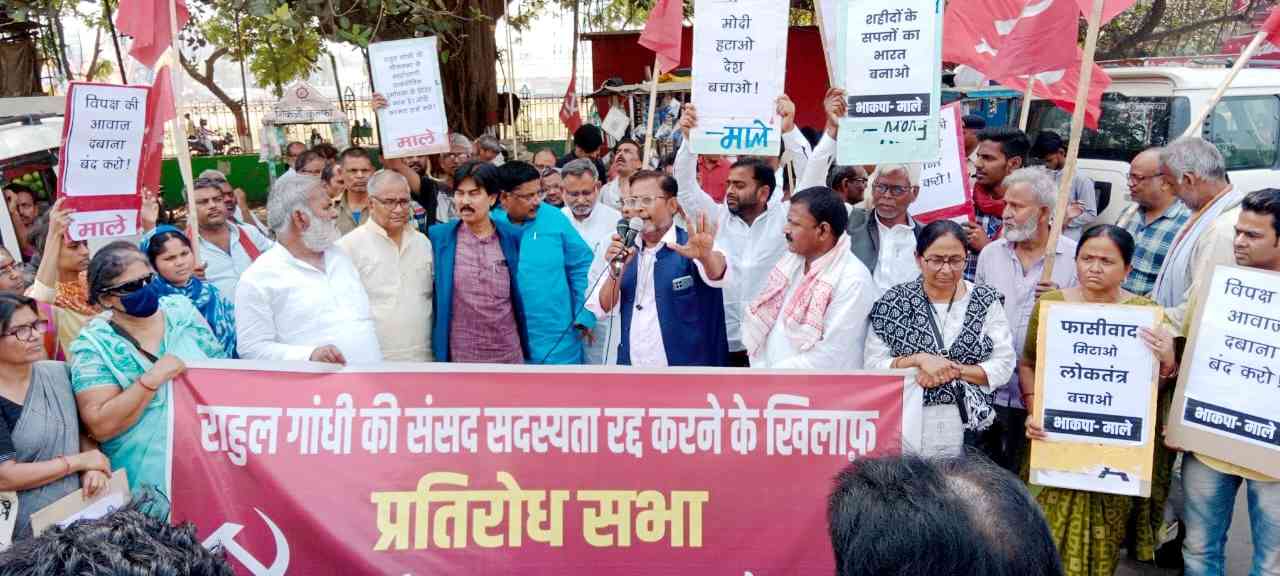DEFEAT THE MODI REGIME'S SURGICAL STRIKE ON DEMOCRACY

The Modi government's desperate campaign against the opposition has assumed the proportions of an intensifying war on India's parliamentary democracy. Even as the opposition started demanding the formation of a Joint Parliamentary Committee to probe the Adani scam and Rahul Gandhi questioned the Modi-Adani nexus, a vindictive Modi government went berserk to target the opposition. All critical references were expunged from Rahul Gandhi's speech, and subsequent proceedings in Parliament were blocked by the ruling party demanding an apology from Rahul Gandhi for alleged remarks that he had not actually made during his recent trip to London. Meanwhile on 21 February, the Gujarat High Court lifted the stay it had granted on the April 2019 criminal defamation case against Rahul Gandhi and on 23 March Rahul Gandhi was convicted and sentenced to two years' imprisonment. The next day itself he was disqualified by the Lok Sabha secretariat.
The speed with which the entire move has been executed can only be likened to a surgical strike. Equally unmistakable is the intriguing nature of the trajectory of the case. Questions are being raised about the validity of the criminal defamation case itself, for the complainant has presented it to be a case of defamation against all people having the surname Modi while a criminal defamation suit is usually filed by a person whose reputation has been directly hurt. In an intriguing development the complainant himself sought and obtained a stay over the case from the Gujarat High Court in March 2022 on the plea of not having sufficient evidence. The same complainant mysteriously appealed for resumption of the case in February 2023 and the hearing was concluded and sentence issued within a month.
Imprisonment for two years is the highest possible sentence in a criminal defamation case and the Surat Court issued that highest sentence. For disqualification of an elected representative in the wake of conviction, an imprisonment for two years is the minimum sentence needed. While Rahul Gandhi's disqualification can thus be described as a 'fait accompli', the alacrity with which he was disqualified by the Lok Sabha secretariat within less than twenty-four hours defied all established norms. According to former Secretary General of the Lok Sabha PDT Achary, the prerogative to announce such disqualification lies with the President of India, and not the Lok Sabha speaker. The other implication of Rahul Gandhi's conviction will be his disqualification for a period of eight years for contesting any elections.
A stay on the conviction by any higher court can of course invalidate Rahul Gandhi's disqualification from the current Lok Sabha or from contesting elections. While all eyes will be on the thirty days' time granted by the Surat Court for Rahul Gandhi to seek a legal remedy, what already stands out in stark relief is the BJP's selective use of the law - protectively if its own leaders get convicted and vindictively for the opposition.
There are several cases from BJP-ruled states like UP, Gujarat and Karnataka where convicted MLAs and ministers continued to occupy office for prolonged duration, taking full advantage of the post-conviction period to secure a stay on conviction from a higher court. In Gujarat, Water Resources minister in Modi cabinet Babu Bokhiria continued to occupy office despite being sentenced for three years in 2013 on charges of Illegal mining. He subsequently got a stay on conviction followed by acquittal. In sharp contrast NCP MP from Lakshadweep Mohammad Faizal was promptly disqualified following his conviction in January 2023 on an attempt to murder charge. Even as the order was soon set aside by the Kerala High Court, forcing the Election Commission of India to withhold the by-poll schedule announced for February 27, the Lok Sabha secretariat refuses to withdraw the disqualification order and reinstate him as the elected MP from Lakshadweep.
The BJP's attempt to portray the Rahul Gandhi disqualification as a case of the law taking its own course is therefore brazenly specious. Equally mischievous is the BJP narrative that seeks to present the conviction as a vindication of OBC pride. Fugitive businessmen Nirav Modi and Lalit Modi have no OBC connection. The party that is doing everything possible to subvert and truncate reservation, and continues to deny opportunities to SC/ST/OBCs by opposing private sector reservation and caste census and routinely humiliates OBC leaders from opposition parties is trying to give a pro-OBC spin to this blatant persecution of a foremost leader of the Congress and the entire opposition.
The conspiratorial disqualification of Rahul Gandhi marks a desperate attempt on the part of the Modi regime to suppress the questions arising out of the Adani mega scam and silence the opposition and the people ahead of the 2024 elections. We should make sure that the move backfires on the Modi regime. It has already signalled signs of generating a broader opposition unity in action and triggering a greater awakening among the people. The Adani scam must not be seen merely as a gigantic corporate fraud, it is first and foremost a case of corporate hijack of Indian democracy and economy by the Modi-Adani nexus, forged in an intimate partnership between centralisation of power and concentration of wealth. We need to link the Adani scam to the pressing issues of the day like privatisation and job loss and expose the fallacy of the BJP narrative of nationalism and development by highlighting the reality of corporate loot and mass deprivation. The people's urge for democracy must prevail over the tyrant's design of aggression.
Charu Bhawan, U-90, Shakarpur, Delhi 110092
Phone: +91-11-42785864 | +91 9717274961 E-mail: info@cpiml.org

